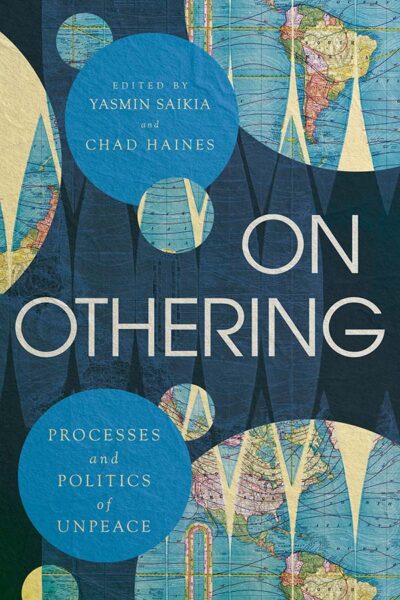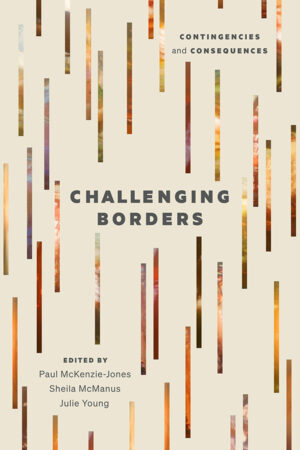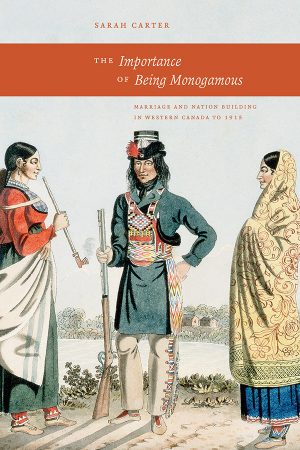Subjects: History, Peace and Conflict Studies, Philosophy
Series: Global Peace Studies
Imprint: AU Press
- 9781771993869 (paperback)
- 9781771993876 (pdf)
- 9781771993883 (epub)
In every sphere of life, division and intolerance have polarized communities and entire nations. The learned construction of the Other—an evil “enemy” against whom both physical and discursive violence is deemed acceptable—has fractured humanity, creating divisions that seemingly defy reconciliation. How do we restore the bonds of connection among human beings? How do we shift from polarization to peace?
On Othering: Processes and Politics of Unpeace examines the process of othering from an international perspective and considers how it undermines peacemaking and is perpetuated by colonialism and globalization. Taking a humanistic approach, contributors argue that celebrating differences can have a transformative change in seeking peaceful solutions to problems created by people, institutions, ideas, conditions, and circumstances. Touching on race, gender, sexuality, nationalism, and our relationship with the natural world, this volume attends to the deep injustices brought about by othering and recommends actions for mending the relationships that are essential to renewing the possibility of peace.
Table of Contents
- Acknowledgements
- Introduction
- Part 1. The Other Within
- 1. Hosting the Hostage: Hospitality, the Uyghur Other, and Chinese State-Imposed Peace
Timothy A. Grose - 2. The Ubiquitous Other, or the Muslims of Assam: Is Peace Possible?
Yasmin Saikia - 3. Bordering and Everyday Peace with the Other
Kathryn Cassidy
- 1. Hosting the Hostage: Hospitality, the Uyghur Other, and Chinese State-Imposed Peace
- Part 2. The Marginal Other: Gender, Sexuality, and Race
- 4. Muslims in Italy: Rooting and Pluralism, Inequalities and Islamophobia
Fabio Perocco - 5. Global North Homoimperialism and the Conundrum of Queer Asylum
Nikoli Attai - 6. Unfree Muslims: Islamophobia and the (Im)Possibilities of Muslim Belonging in America
Chad Haines - 7. Killing Machine: How Mexican and US States of Exception Turned Revolutionaries and Migrants into Bare Life, 1969–1996
Alexander Aviña - 8. There Are No Signs: Feeling Black in a Post–Jim Crow America
Camille D. Burge - 9. Building Bridges Between Queer and Normative Muslims
Maryam Khan
- 4. Muslims in Italy: Rooting and Pluralism, Inequalities and Islamophobia
- Part 3. Nature as Other: The Human and Nonhuman Relationship
- 10. “A Foothold in the Sheer Wall of the Future”: Extinction, Making Kin, and Imagining Peace in The Ministry of Utmost Happiness
Amit R. Baishya - 11. The Earth as a Phobic Object: Negative Ecology and the Rise of Eco-Fascism
Frédéric Neyrat - 12. “Peace” for Indigenous Peoples: Land-Based Visions of Reconciliation
Rebecca Tsosie
- 10. “A Foothold in the Sheer Wall of the Future”: Extinction, Making Kin, and Imagining Peace in The Ministry of Utmost Happiness
- Afterword: Imagining People’s Peace
Chad Haines and Yasmin Saikia - Contributors
This work is licensed under a Creative Commons License (CC BY-NC-ND 4.0). It may be reproduced for non-commercial purposes, provided that the original author is credited.

![[book cover] The ABCs of Human Survival](https://www.aupress.ca/app/uploads/120173_The-ABCs-of-Human-Survival-cover-275x450.jpg)


